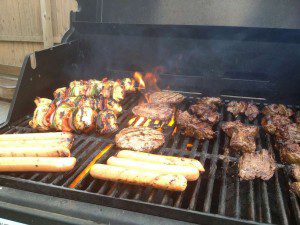Grilling is a classic pastime during the summer season, especially in sunny Florida. Friends and family sit on the deck, ready to eat a tender, juicy steak fresh off the barbecue. One family member has the singular responsibility of cooking the food to everyone’s satisfaction. But grilling duties encompass much more than making sure food doesn’t burn. The Florida Department of Health (DOH) would like to remind everyone this summer that there are several rules of grilling safety you should follow in order to prevent not just serious injuries but food-borne illnesses as well.
According to the US Fire Administration, Florida has a relatively low (0.7 percent) fire death rate. Despite this fact, home fires do account for at least half of all fires in the United States. To avoid starting a fire in your own home, remember the following tips:
- Use propane and charcoal grills only outdoors, in open, safe environments.
- Keep grills far from both children and pets.
- Thoroughly inspect the grill before using it every year, and check for signs that indicate a gas leak.
In Florida, the number of emergency room visits due to carbon monoxide poisoning has doubled since 2006. This makes it important to never leave a grill unattended even for a minute. The adult using the grill should know how to reach the fire department and a fire extinguisher. If there is a gas leak, turn off the grill completely, disconnect all connections, and step away from the area.
Risk of food poisoning is also heightened when cooking outside, as many bacteria can easily infect your food if you’re not careful. Most foodborne bacteria grow fastest at temperatures from 90 to 110 °F. These microorganisms grow more rapidly in the warm summer months, because the air is moist enough for them to thrive.
Before raw food even touches your grill, you should take the following precautions:
- When carrying meat to another location, keep it cold to minimize bacterial growth. Use an insulated cooler with sufficient ice or ice packs to keep the food at 40 °F or below.
- Pack food right from the refrigerator into the cooler immediately before leaving home.
- In hot weather (above 90 °F), food should never sit out for more than 1 hour.
- Keep meat and poultry refrigerated until ready to use. Only take out the meat and poultry that will immediately be placed on the grill.
- NEVER partially grill meat or poultry and finish cooking later.
After following these tips, make sure to cook food to a safe internal temperature (greater than 145°F) to destroy harmful bacteria. Meat and poultry cooked on a grill may brown very quickly on the outside, but the inside could still be raw. Use a food thermometer to ensure the food has been cooked to a safe internal temperature.
Keeping your hands and the area around you clean is another way to prevent bacteria from getting in your food. Make sure to wash your hands before and after handling raw food, and remember to thoroughly wash the utensils you used. Cross-contamination during preparation, grilling, and serving food is a common cause of foodborne illness.
Remember, when in doubt, throw it out! Follow our safety tips to make sure you enjoy the best part of a Florida summer.
Florida Department of Health article



